CHCECE017/020: Child Wellbeing, Cooperative Behavior & Education
VerifiedAdded on 2023/06/07
|10
|2290
|363
Report
AI Summary
This report provides an overview of establishing and implementing plans for developing cooperative behaviors among children, referencing the ECA Code of Ethics and UN Rights of the Child. It also reviews early childhood education and care service philosophy documents in relation to sustainable practice and links them to the National Quality Standards, addressing climate change issues. Furthermore, the report explores fostering holistic development and wellbeing of the child in early childhood from socio-behaviorist, developmental, socio-cultural, critical, and post-structuralist perspectives, relating each perspective to pedagogical practice and the National Quality Framework.
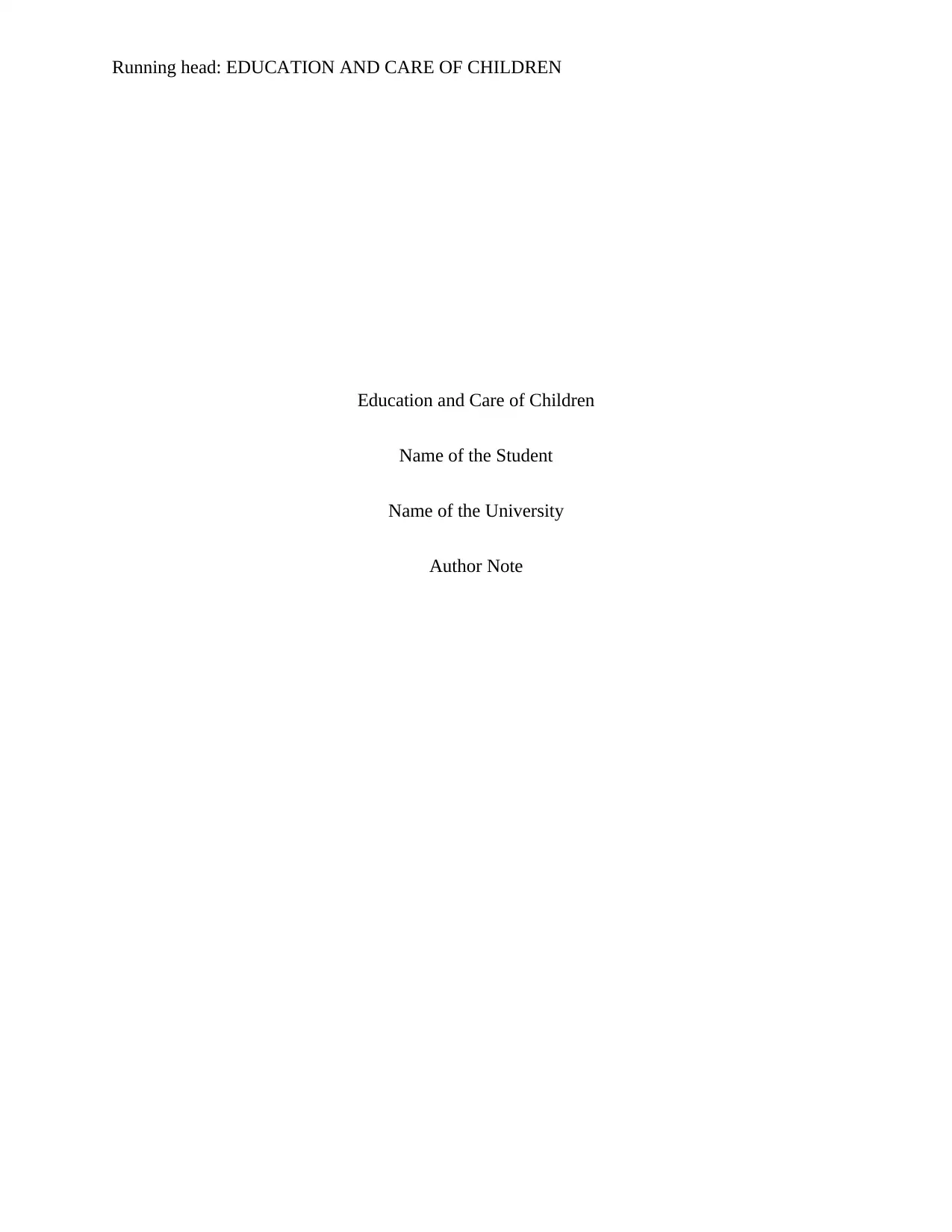
Running head: EDUCATION AND CARE OF CHILDREN
Education and Care of Children
Name of the Student
Name of the University
Author Note
Education and Care of Children
Name of the Student
Name of the University
Author Note
Paraphrase This Document
Need a fresh take? Get an instant paraphrase of this document with our AI Paraphraser
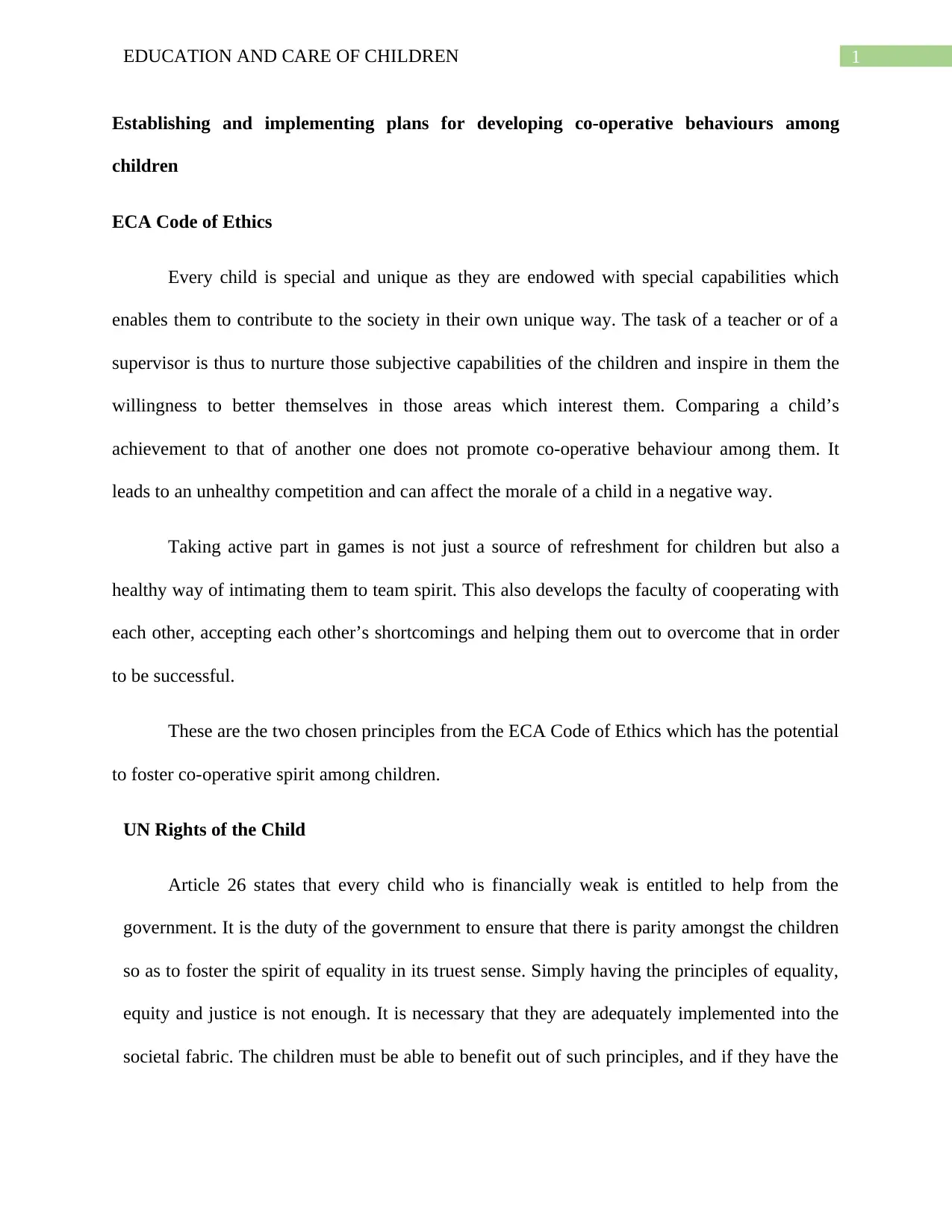
1EDUCATION AND CARE OF CHILDREN
Establishing and implementing plans for developing co-operative behaviours among
children
ECA Code of Ethics
Every child is special and unique as they are endowed with special capabilities which
enables them to contribute to the society in their own unique way. The task of a teacher or of a
supervisor is thus to nurture those subjective capabilities of the children and inspire in them the
willingness to better themselves in those areas which interest them. Comparing a child’s
achievement to that of another one does not promote co-operative behaviour among them. It
leads to an unhealthy competition and can affect the morale of a child in a negative way.
Taking active part in games is not just a source of refreshment for children but also a
healthy way of intimating them to team spirit. This also develops the faculty of cooperating with
each other, accepting each other’s shortcomings and helping them out to overcome that in order
to be successful.
These are the two chosen principles from the ECA Code of Ethics which has the potential
to foster co-operative spirit among children.
UN Rights of the Child
Article 26 states that every child who is financially weak is entitled to help from the
government. It is the duty of the government to ensure that there is parity amongst the children
so as to foster the spirit of equality in its truest sense. Simply having the principles of equality,
equity and justice is not enough. It is necessary that they are adequately implemented into the
societal fabric. The children must be able to benefit out of such principles, and if they have the
Establishing and implementing plans for developing co-operative behaviours among
children
ECA Code of Ethics
Every child is special and unique as they are endowed with special capabilities which
enables them to contribute to the society in their own unique way. The task of a teacher or of a
supervisor is thus to nurture those subjective capabilities of the children and inspire in them the
willingness to better themselves in those areas which interest them. Comparing a child’s
achievement to that of another one does not promote co-operative behaviour among them. It
leads to an unhealthy competition and can affect the morale of a child in a negative way.
Taking active part in games is not just a source of refreshment for children but also a
healthy way of intimating them to team spirit. This also develops the faculty of cooperating with
each other, accepting each other’s shortcomings and helping them out to overcome that in order
to be successful.
These are the two chosen principles from the ECA Code of Ethics which has the potential
to foster co-operative spirit among children.
UN Rights of the Child
Article 26 states that every child who is financially weak is entitled to help from the
government. It is the duty of the government to ensure that there is parity amongst the children
so as to foster the spirit of equality in its truest sense. Simply having the principles of equality,
equity and justice is not enough. It is necessary that they are adequately implemented into the
societal fabric. The children must be able to benefit out of such principles, and if they have the
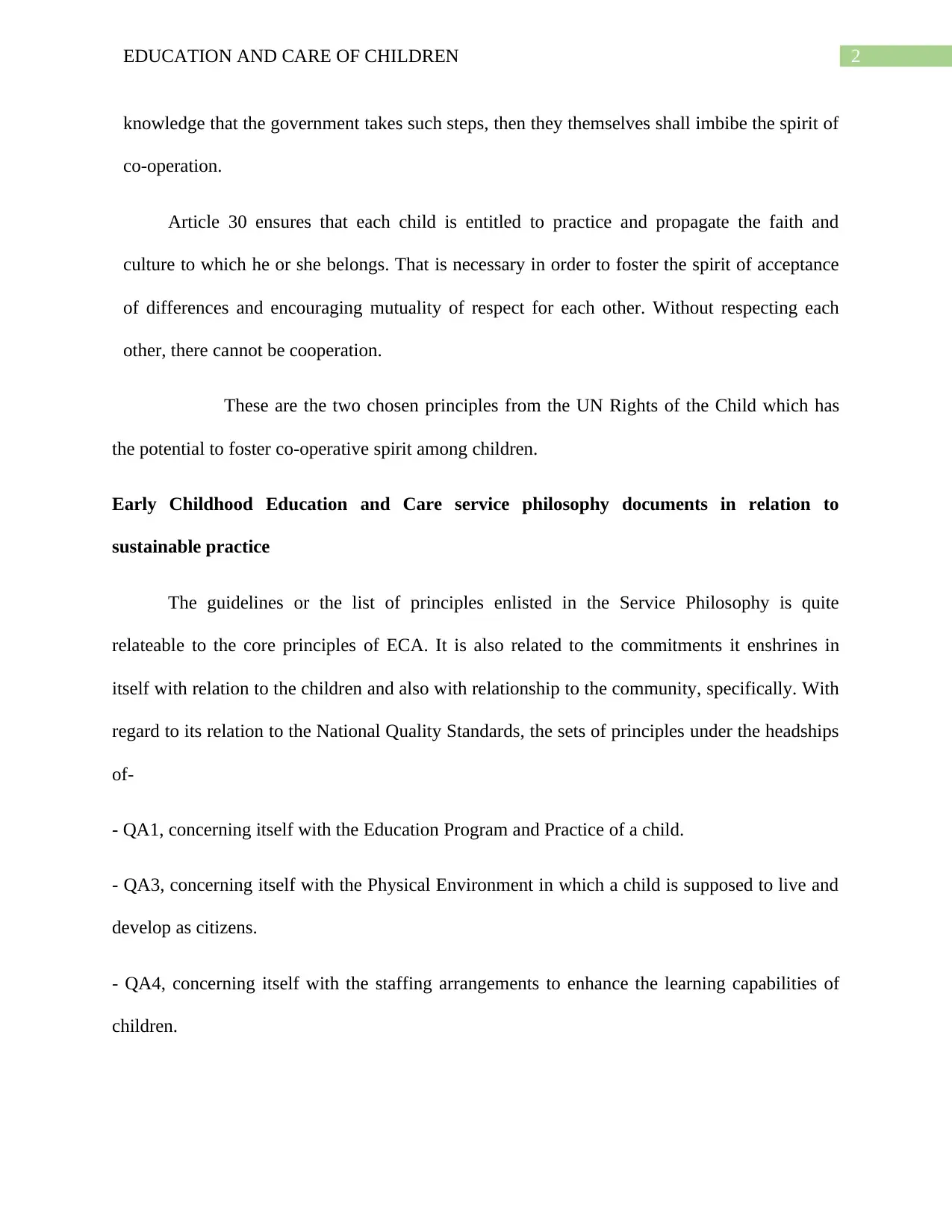
2EDUCATION AND CARE OF CHILDREN
knowledge that the government takes such steps, then they themselves shall imbibe the spirit of
co-operation.
Article 30 ensures that each child is entitled to practice and propagate the faith and
culture to which he or she belongs. That is necessary in order to foster the spirit of acceptance
of differences and encouraging mutuality of respect for each other. Without respecting each
other, there cannot be cooperation.
These are the two chosen principles from the UN Rights of the Child which has
the potential to foster co-operative spirit among children.
Early Childhood Education and Care service philosophy documents in relation to
sustainable practice
The guidelines or the list of principles enlisted in the Service Philosophy is quite
relateable to the core principles of ECA. It is also related to the commitments it enshrines in
itself with relation to the children and also with relationship to the community, specifically. With
regard to its relation to the National Quality Standards, the sets of principles under the headships
of-
- QA1, concerning itself with the Education Program and Practice of a child.
- QA3, concerning itself with the Physical Environment in which a child is supposed to live and
develop as citizens.
- QA4, concerning itself with the staffing arrangements to enhance the learning capabilities of
children.
knowledge that the government takes such steps, then they themselves shall imbibe the spirit of
co-operation.
Article 30 ensures that each child is entitled to practice and propagate the faith and
culture to which he or she belongs. That is necessary in order to foster the spirit of acceptance
of differences and encouraging mutuality of respect for each other. Without respecting each
other, there cannot be cooperation.
These are the two chosen principles from the UN Rights of the Child which has
the potential to foster co-operative spirit among children.
Early Childhood Education and Care service philosophy documents in relation to
sustainable practice
The guidelines or the list of principles enlisted in the Service Philosophy is quite
relateable to the core principles of ECA. It is also related to the commitments it enshrines in
itself with relation to the children and also with relationship to the community, specifically. With
regard to its relation to the National Quality Standards, the sets of principles under the headships
of-
- QA1, concerning itself with the Education Program and Practice of a child.
- QA3, concerning itself with the Physical Environment in which a child is supposed to live and
develop as citizens.
- QA4, concerning itself with the staffing arrangements to enhance the learning capabilities of
children.
⊘ This is a preview!⊘
Do you want full access?
Subscribe today to unlock all pages.

Trusted by 1+ million students worldwide
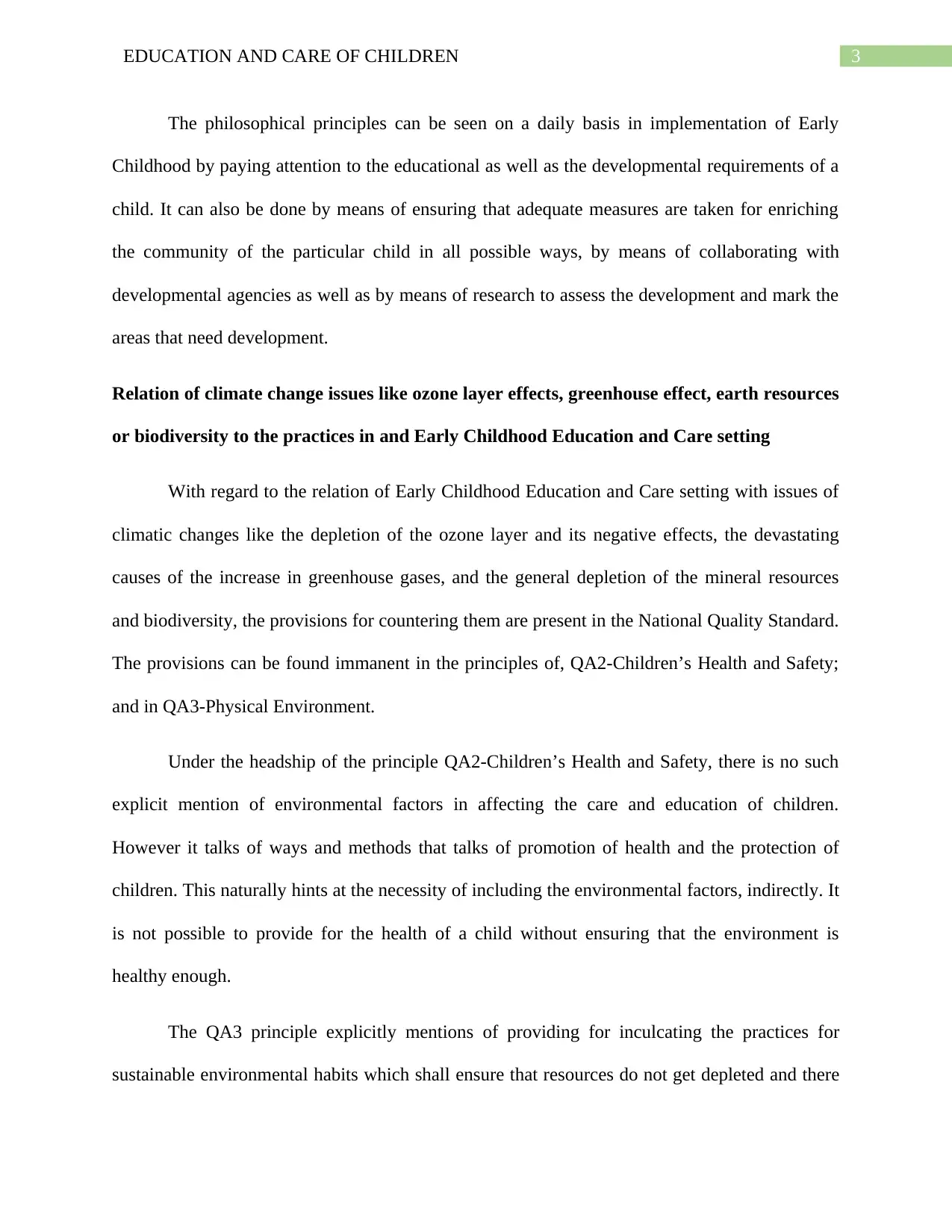
3EDUCATION AND CARE OF CHILDREN
The philosophical principles can be seen on a daily basis in implementation of Early
Childhood by paying attention to the educational as well as the developmental requirements of a
child. It can also be done by means of ensuring that adequate measures are taken for enriching
the community of the particular child in all possible ways, by means of collaborating with
developmental agencies as well as by means of research to assess the development and mark the
areas that need development.
Relation of climate change issues like ozone layer effects, greenhouse effect, earth resources
or biodiversity to the practices in and Early Childhood Education and Care setting
With regard to the relation of Early Childhood Education and Care setting with issues of
climatic changes like the depletion of the ozone layer and its negative effects, the devastating
causes of the increase in greenhouse gases, and the general depletion of the mineral resources
and biodiversity, the provisions for countering them are present in the National Quality Standard.
The provisions can be found immanent in the principles of, QA2-Children’s Health and Safety;
and in QA3-Physical Environment.
Under the headship of the principle QA2-Children’s Health and Safety, there is no such
explicit mention of environmental factors in affecting the care and education of children.
However it talks of ways and methods that talks of promotion of health and the protection of
children. This naturally hints at the necessity of including the environmental factors, indirectly. It
is not possible to provide for the health of a child without ensuring that the environment is
healthy enough.
The QA3 principle explicitly mentions of providing for inculcating the practices for
sustainable environmental habits which shall ensure that resources do not get depleted and there
The philosophical principles can be seen on a daily basis in implementation of Early
Childhood by paying attention to the educational as well as the developmental requirements of a
child. It can also be done by means of ensuring that adequate measures are taken for enriching
the community of the particular child in all possible ways, by means of collaborating with
developmental agencies as well as by means of research to assess the development and mark the
areas that need development.
Relation of climate change issues like ozone layer effects, greenhouse effect, earth resources
or biodiversity to the practices in and Early Childhood Education and Care setting
With regard to the relation of Early Childhood Education and Care setting with issues of
climatic changes like the depletion of the ozone layer and its negative effects, the devastating
causes of the increase in greenhouse gases, and the general depletion of the mineral resources
and biodiversity, the provisions for countering them are present in the National Quality Standard.
The provisions can be found immanent in the principles of, QA2-Children’s Health and Safety;
and in QA3-Physical Environment.
Under the headship of the principle QA2-Children’s Health and Safety, there is no such
explicit mention of environmental factors in affecting the care and education of children.
However it talks of ways and methods that talks of promotion of health and the protection of
children. This naturally hints at the necessity of including the environmental factors, indirectly. It
is not possible to provide for the health of a child without ensuring that the environment is
healthy enough.
The QA3 principle explicitly mentions of providing for inculcating the practices for
sustainable environmental habits which shall ensure that resources do not get depleted and there
Paraphrase This Document
Need a fresh take? Get an instant paraphrase of this document with our AI Paraphraser
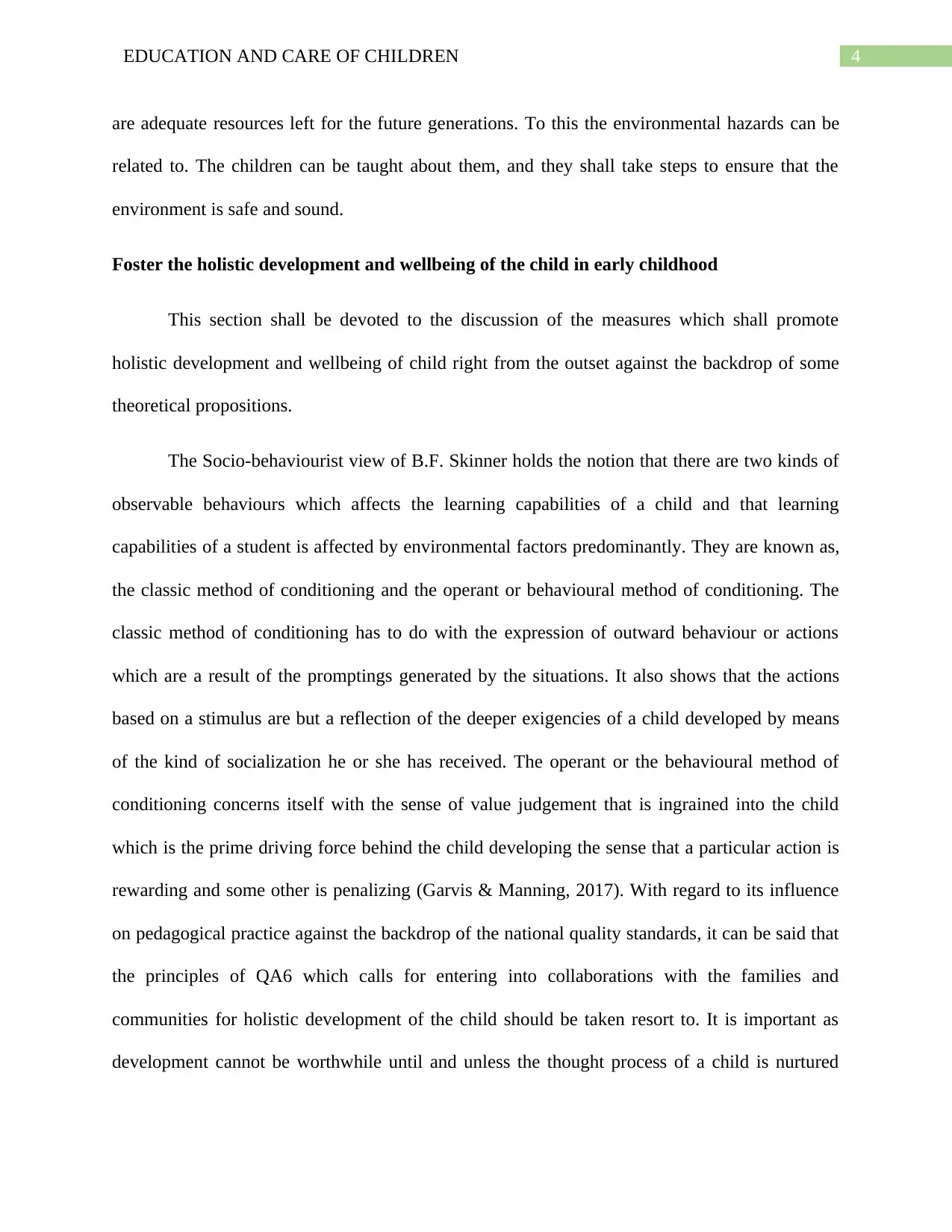
4EDUCATION AND CARE OF CHILDREN
are adequate resources left for the future generations. To this the environmental hazards can be
related to. The children can be taught about them, and they shall take steps to ensure that the
environment is safe and sound.
Foster the holistic development and wellbeing of the child in early childhood
This section shall be devoted to the discussion of the measures which shall promote
holistic development and wellbeing of child right from the outset against the backdrop of some
theoretical propositions.
The Socio-behaviourist view of B.F. Skinner holds the notion that there are two kinds of
observable behaviours which affects the learning capabilities of a child and that learning
capabilities of a student is affected by environmental factors predominantly. They are known as,
the classic method of conditioning and the operant or behavioural method of conditioning. The
classic method of conditioning has to do with the expression of outward behaviour or actions
which are a result of the promptings generated by the situations. It also shows that the actions
based on a stimulus are but a reflection of the deeper exigencies of a child developed by means
of the kind of socialization he or she has received. The operant or the behavioural method of
conditioning concerns itself with the sense of value judgement that is ingrained into the child
which is the prime driving force behind the child developing the sense that a particular action is
rewarding and some other is penalizing (Garvis & Manning, 2017). With regard to its influence
on pedagogical practice against the backdrop of the national quality standards, it can be said that
the principles of QA6 which calls for entering into collaborations with the families and
communities for holistic development of the child should be taken resort to. It is important as
development cannot be worthwhile until and unless the thought process of a child is nurtured
are adequate resources left for the future generations. To this the environmental hazards can be
related to. The children can be taught about them, and they shall take steps to ensure that the
environment is safe and sound.
Foster the holistic development and wellbeing of the child in early childhood
This section shall be devoted to the discussion of the measures which shall promote
holistic development and wellbeing of child right from the outset against the backdrop of some
theoretical propositions.
The Socio-behaviourist view of B.F. Skinner holds the notion that there are two kinds of
observable behaviours which affects the learning capabilities of a child and that learning
capabilities of a student is affected by environmental factors predominantly. They are known as,
the classic method of conditioning and the operant or behavioural method of conditioning. The
classic method of conditioning has to do with the expression of outward behaviour or actions
which are a result of the promptings generated by the situations. It also shows that the actions
based on a stimulus are but a reflection of the deeper exigencies of a child developed by means
of the kind of socialization he or she has received. The operant or the behavioural method of
conditioning concerns itself with the sense of value judgement that is ingrained into the child
which is the prime driving force behind the child developing the sense that a particular action is
rewarding and some other is penalizing (Garvis & Manning, 2017). With regard to its influence
on pedagogical practice against the backdrop of the national quality standards, it can be said that
the principles of QA6 which calls for entering into collaborations with the families and
communities for holistic development of the child should be taken resort to. It is important as
development cannot be worthwhile until and unless the thought process of a child is nurtured
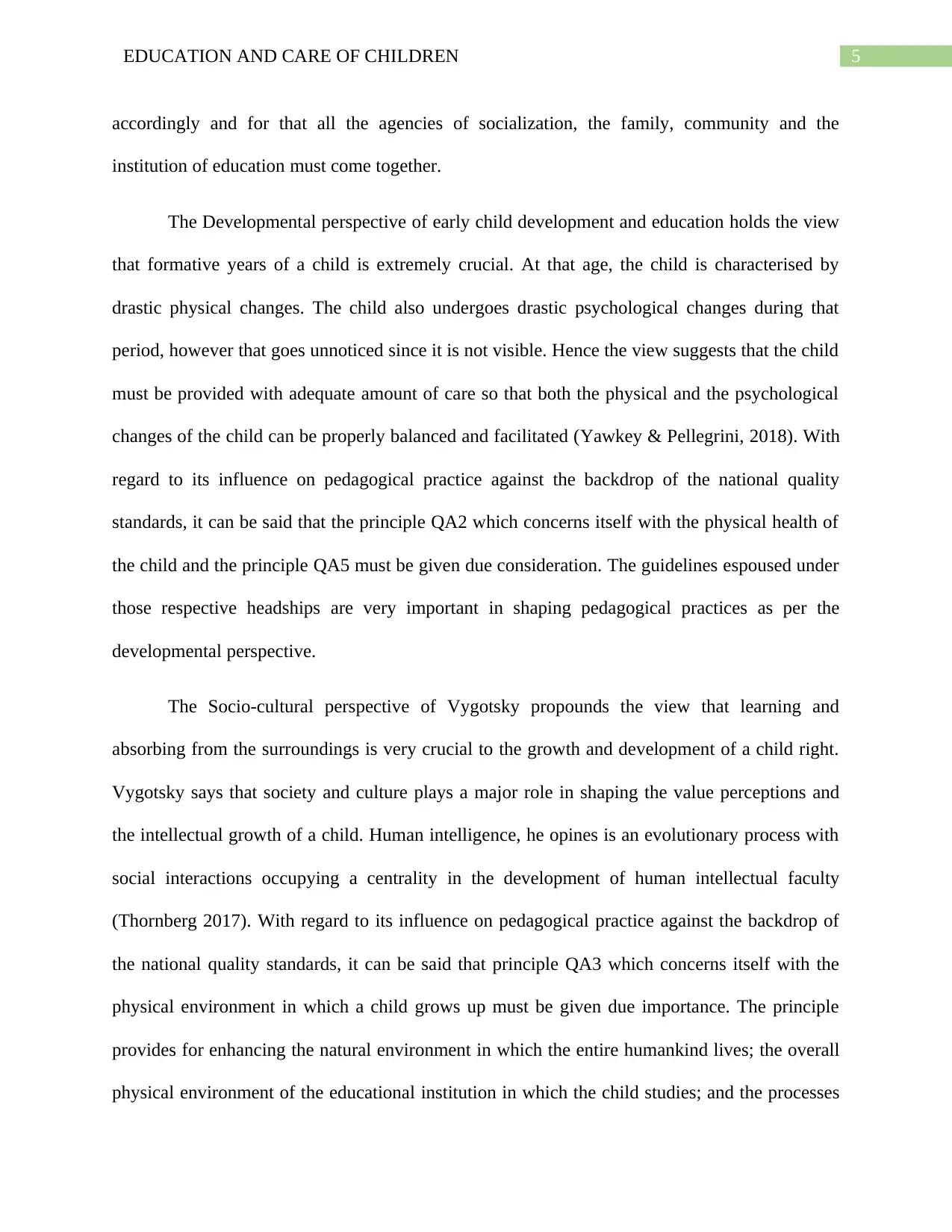
5EDUCATION AND CARE OF CHILDREN
accordingly and for that all the agencies of socialization, the family, community and the
institution of education must come together.
The Developmental perspective of early child development and education holds the view
that formative years of a child is extremely crucial. At that age, the child is characterised by
drastic physical changes. The child also undergoes drastic psychological changes during that
period, however that goes unnoticed since it is not visible. Hence the view suggests that the child
must be provided with adequate amount of care so that both the physical and the psychological
changes of the child can be properly balanced and facilitated (Yawkey & Pellegrini, 2018). With
regard to its influence on pedagogical practice against the backdrop of the national quality
standards, it can be said that the principle QA2 which concerns itself with the physical health of
the child and the principle QA5 must be given due consideration. The guidelines espoused under
those respective headships are very important in shaping pedagogical practices as per the
developmental perspective.
The Socio-cultural perspective of Vygotsky propounds the view that learning and
absorbing from the surroundings is very crucial to the growth and development of a child right.
Vygotsky says that society and culture plays a major role in shaping the value perceptions and
the intellectual growth of a child. Human intelligence, he opines is an evolutionary process with
social interactions occupying a centrality in the development of human intellectual faculty
(Thornberg 2017). With regard to its influence on pedagogical practice against the backdrop of
the national quality standards, it can be said that principle QA3 which concerns itself with the
physical environment in which a child grows up must be given due importance. The principle
provides for enhancing the natural environment in which the entire humankind lives; the overall
physical environment of the educational institution in which the child studies; and the processes
accordingly and for that all the agencies of socialization, the family, community and the
institution of education must come together.
The Developmental perspective of early child development and education holds the view
that formative years of a child is extremely crucial. At that age, the child is characterised by
drastic physical changes. The child also undergoes drastic psychological changes during that
period, however that goes unnoticed since it is not visible. Hence the view suggests that the child
must be provided with adequate amount of care so that both the physical and the psychological
changes of the child can be properly balanced and facilitated (Yawkey & Pellegrini, 2018). With
regard to its influence on pedagogical practice against the backdrop of the national quality
standards, it can be said that the principle QA2 which concerns itself with the physical health of
the child and the principle QA5 must be given due consideration. The guidelines espoused under
those respective headships are very important in shaping pedagogical practices as per the
developmental perspective.
The Socio-cultural perspective of Vygotsky propounds the view that learning and
absorbing from the surroundings is very crucial to the growth and development of a child right.
Vygotsky says that society and culture plays a major role in shaping the value perceptions and
the intellectual growth of a child. Human intelligence, he opines is an evolutionary process with
social interactions occupying a centrality in the development of human intellectual faculty
(Thornberg 2017). With regard to its influence on pedagogical practice against the backdrop of
the national quality standards, it can be said that principle QA3 which concerns itself with the
physical environment in which a child grows up must be given due importance. The principle
provides for enhancing the natural environment in which the entire humankind lives; the overall
physical environment of the educational institution in which the child studies; and the processes
⊘ This is a preview!⊘
Do you want full access?
Subscribe today to unlock all pages.

Trusted by 1+ million students worldwide
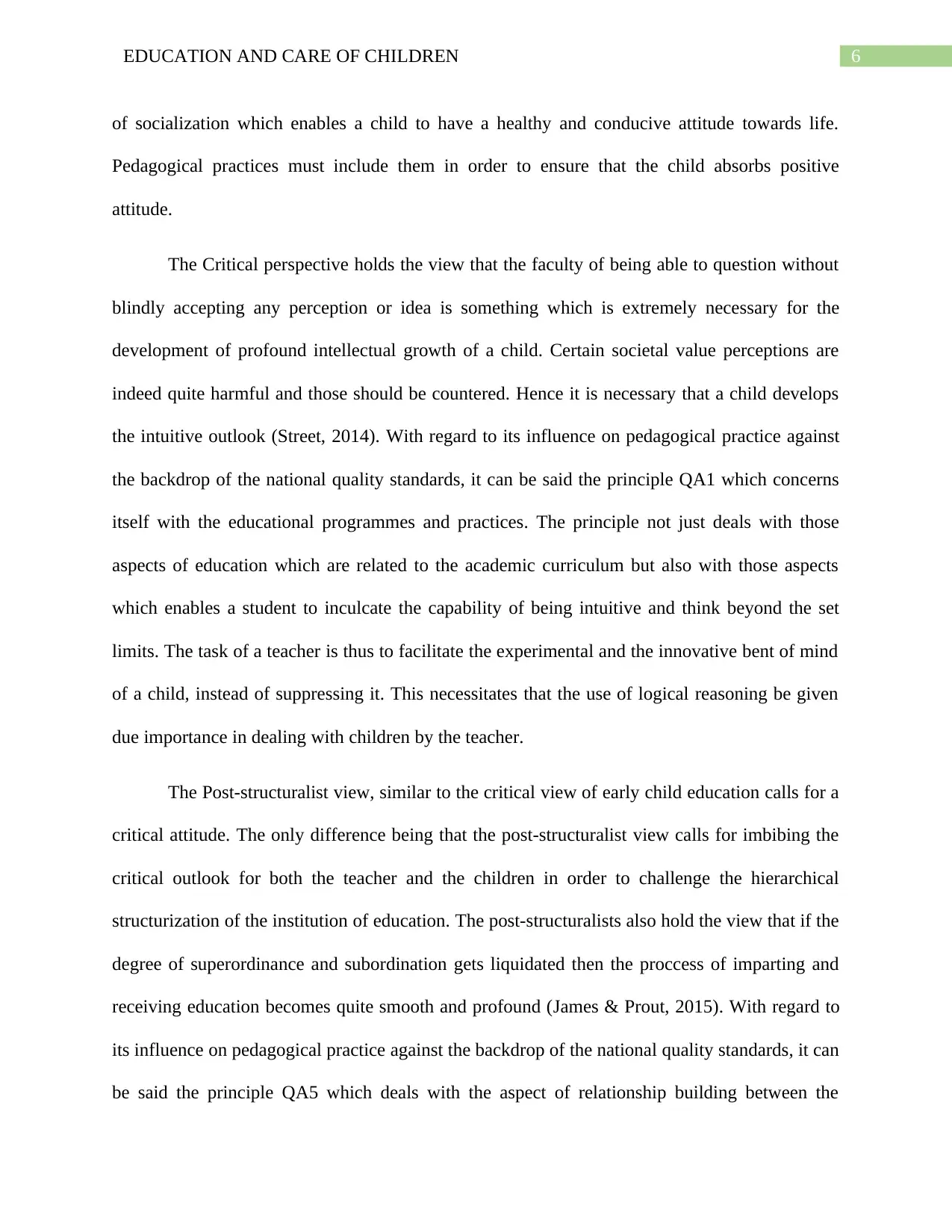
6EDUCATION AND CARE OF CHILDREN
of socialization which enables a child to have a healthy and conducive attitude towards life.
Pedagogical practices must include them in order to ensure that the child absorbs positive
attitude.
The Critical perspective holds the view that the faculty of being able to question without
blindly accepting any perception or idea is something which is extremely necessary for the
development of profound intellectual growth of a child. Certain societal value perceptions are
indeed quite harmful and those should be countered. Hence it is necessary that a child develops
the intuitive outlook (Street, 2014). With regard to its influence on pedagogical practice against
the backdrop of the national quality standards, it can be said the principle QA1 which concerns
itself with the educational programmes and practices. The principle not just deals with those
aspects of education which are related to the academic curriculum but also with those aspects
which enables a student to inculcate the capability of being intuitive and think beyond the set
limits. The task of a teacher is thus to facilitate the experimental and the innovative bent of mind
of a child, instead of suppressing it. This necessitates that the use of logical reasoning be given
due importance in dealing with children by the teacher.
The Post-structuralist view, similar to the critical view of early child education calls for a
critical attitude. The only difference being that the post-structuralist view calls for imbibing the
critical outlook for both the teacher and the children in order to challenge the hierarchical
structurization of the institution of education. The post-structuralists also hold the view that if the
degree of superordinance and subordination gets liquidated then the proccess of imparting and
receiving education becomes quite smooth and profound (James & Prout, 2015). With regard to
its influence on pedagogical practice against the backdrop of the national quality standards, it can
be said the principle QA5 which deals with the aspect of relationship building between the
of socialization which enables a child to have a healthy and conducive attitude towards life.
Pedagogical practices must include them in order to ensure that the child absorbs positive
attitude.
The Critical perspective holds the view that the faculty of being able to question without
blindly accepting any perception or idea is something which is extremely necessary for the
development of profound intellectual growth of a child. Certain societal value perceptions are
indeed quite harmful and those should be countered. Hence it is necessary that a child develops
the intuitive outlook (Street, 2014). With regard to its influence on pedagogical practice against
the backdrop of the national quality standards, it can be said the principle QA1 which concerns
itself with the educational programmes and practices. The principle not just deals with those
aspects of education which are related to the academic curriculum but also with those aspects
which enables a student to inculcate the capability of being intuitive and think beyond the set
limits. The task of a teacher is thus to facilitate the experimental and the innovative bent of mind
of a child, instead of suppressing it. This necessitates that the use of logical reasoning be given
due importance in dealing with children by the teacher.
The Post-structuralist view, similar to the critical view of early child education calls for a
critical attitude. The only difference being that the post-structuralist view calls for imbibing the
critical outlook for both the teacher and the children in order to challenge the hierarchical
structurization of the institution of education. The post-structuralists also hold the view that if the
degree of superordinance and subordination gets liquidated then the proccess of imparting and
receiving education becomes quite smooth and profound (James & Prout, 2015). With regard to
its influence on pedagogical practice against the backdrop of the national quality standards, it can
be said the principle QA5 which deals with the aspect of relationship building between the
Paraphrase This Document
Need a fresh take? Get an instant paraphrase of this document with our AI Paraphraser
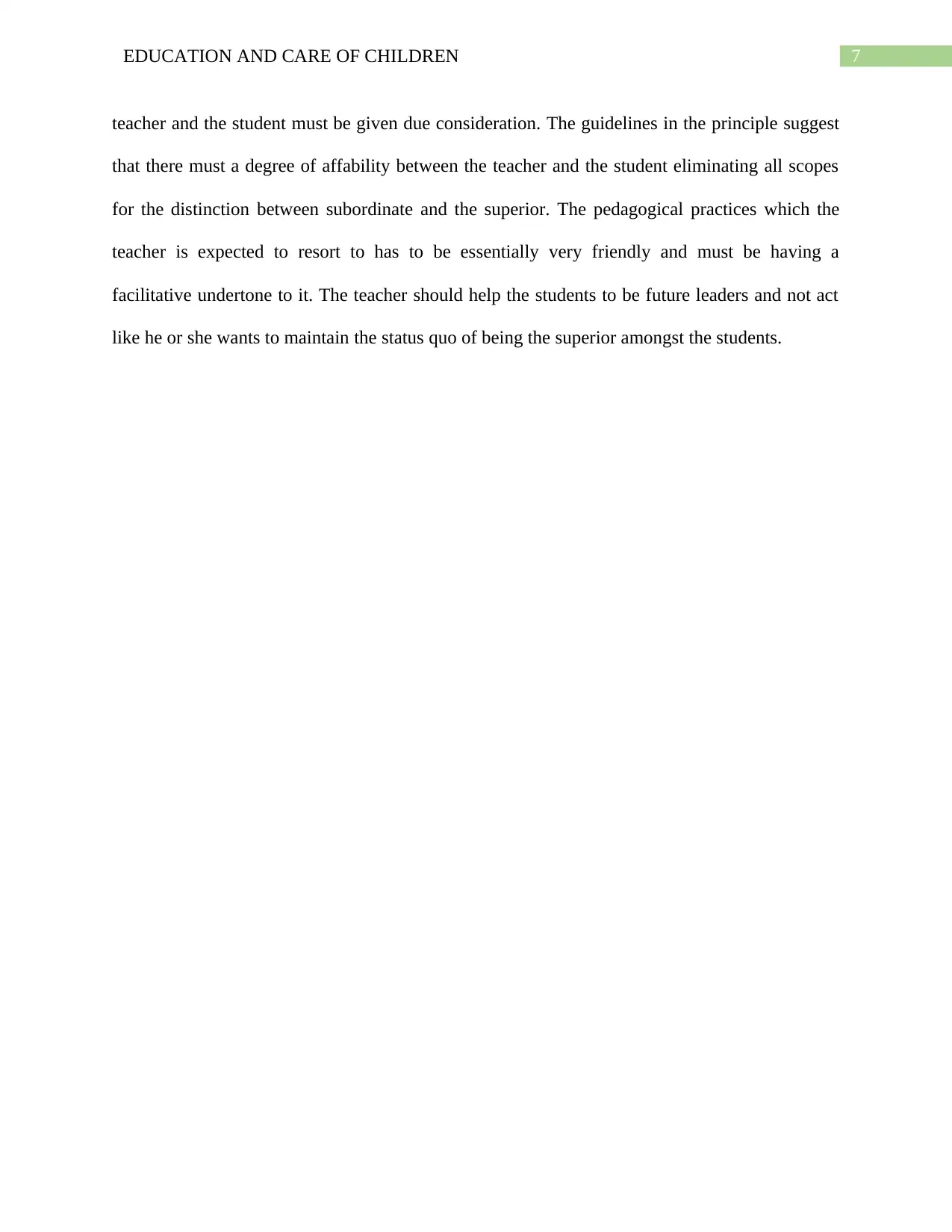
7EDUCATION AND CARE OF CHILDREN
teacher and the student must be given due consideration. The guidelines in the principle suggest
that there must a degree of affability between the teacher and the student eliminating all scopes
for the distinction between subordinate and the superior. The pedagogical practices which the
teacher is expected to resort to has to be essentially very friendly and must be having a
facilitative undertone to it. The teacher should help the students to be future leaders and not act
like he or she wants to maintain the status quo of being the superior amongst the students.
teacher and the student must be given due consideration. The guidelines in the principle suggest
that there must a degree of affability between the teacher and the student eliminating all scopes
for the distinction between subordinate and the superior. The pedagogical practices which the
teacher is expected to resort to has to be essentially very friendly and must be having a
facilitative undertone to it. The teacher should help the students to be future leaders and not act
like he or she wants to maintain the status quo of being the superior amongst the students.
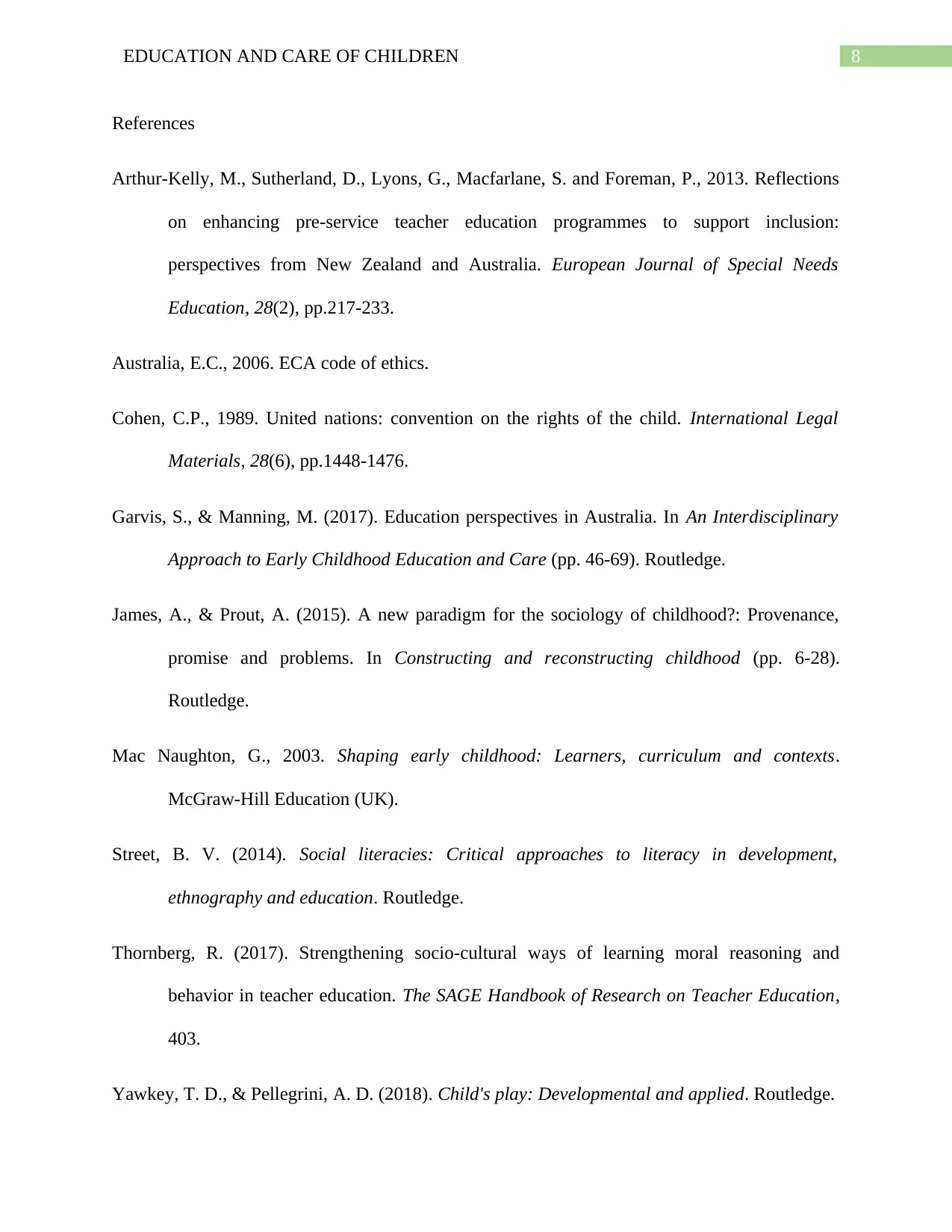
8EDUCATION AND CARE OF CHILDREN
References
Arthur-Kelly, M., Sutherland, D., Lyons, G., Macfarlane, S. and Foreman, P., 2013. Reflections
on enhancing pre-service teacher education programmes to support inclusion:
perspectives from New Zealand and Australia. European Journal of Special Needs
Education, 28(2), pp.217-233.
Australia, E.C., 2006. ECA code of ethics.
Cohen, C.P., 1989. United nations: convention on the rights of the child. International Legal
Materials, 28(6), pp.1448-1476.
Garvis, S., & Manning, M. (2017). Education perspectives in Australia. In An Interdisciplinary
Approach to Early Childhood Education and Care (pp. 46-69). Routledge.
James, A., & Prout, A. (2015). A new paradigm for the sociology of childhood?: Provenance,
promise and problems. In Constructing and reconstructing childhood (pp. 6-28).
Routledge.
Mac Naughton, G., 2003. Shaping early childhood: Learners, curriculum and contexts.
McGraw-Hill Education (UK).
Street, B. V. (2014). Social literacies: Critical approaches to literacy in development,
ethnography and education. Routledge.
Thornberg, R. (2017). Strengthening socio-cultural ways of learning moral reasoning and
behavior in teacher education. The SAGE Handbook of Research on Teacher Education,
403.
Yawkey, T. D., & Pellegrini, A. D. (2018). Child's play: Developmental and applied. Routledge.
References
Arthur-Kelly, M., Sutherland, D., Lyons, G., Macfarlane, S. and Foreman, P., 2013. Reflections
on enhancing pre-service teacher education programmes to support inclusion:
perspectives from New Zealand and Australia. European Journal of Special Needs
Education, 28(2), pp.217-233.
Australia, E.C., 2006. ECA code of ethics.
Cohen, C.P., 1989. United nations: convention on the rights of the child. International Legal
Materials, 28(6), pp.1448-1476.
Garvis, S., & Manning, M. (2017). Education perspectives in Australia. In An Interdisciplinary
Approach to Early Childhood Education and Care (pp. 46-69). Routledge.
James, A., & Prout, A. (2015). A new paradigm for the sociology of childhood?: Provenance,
promise and problems. In Constructing and reconstructing childhood (pp. 6-28).
Routledge.
Mac Naughton, G., 2003. Shaping early childhood: Learners, curriculum and contexts.
McGraw-Hill Education (UK).
Street, B. V. (2014). Social literacies: Critical approaches to literacy in development,
ethnography and education. Routledge.
Thornberg, R. (2017). Strengthening socio-cultural ways of learning moral reasoning and
behavior in teacher education. The SAGE Handbook of Research on Teacher Education,
403.
Yawkey, T. D., & Pellegrini, A. D. (2018). Child's play: Developmental and applied. Routledge.
⊘ This is a preview!⊘
Do you want full access?
Subscribe today to unlock all pages.

Trusted by 1+ million students worldwide
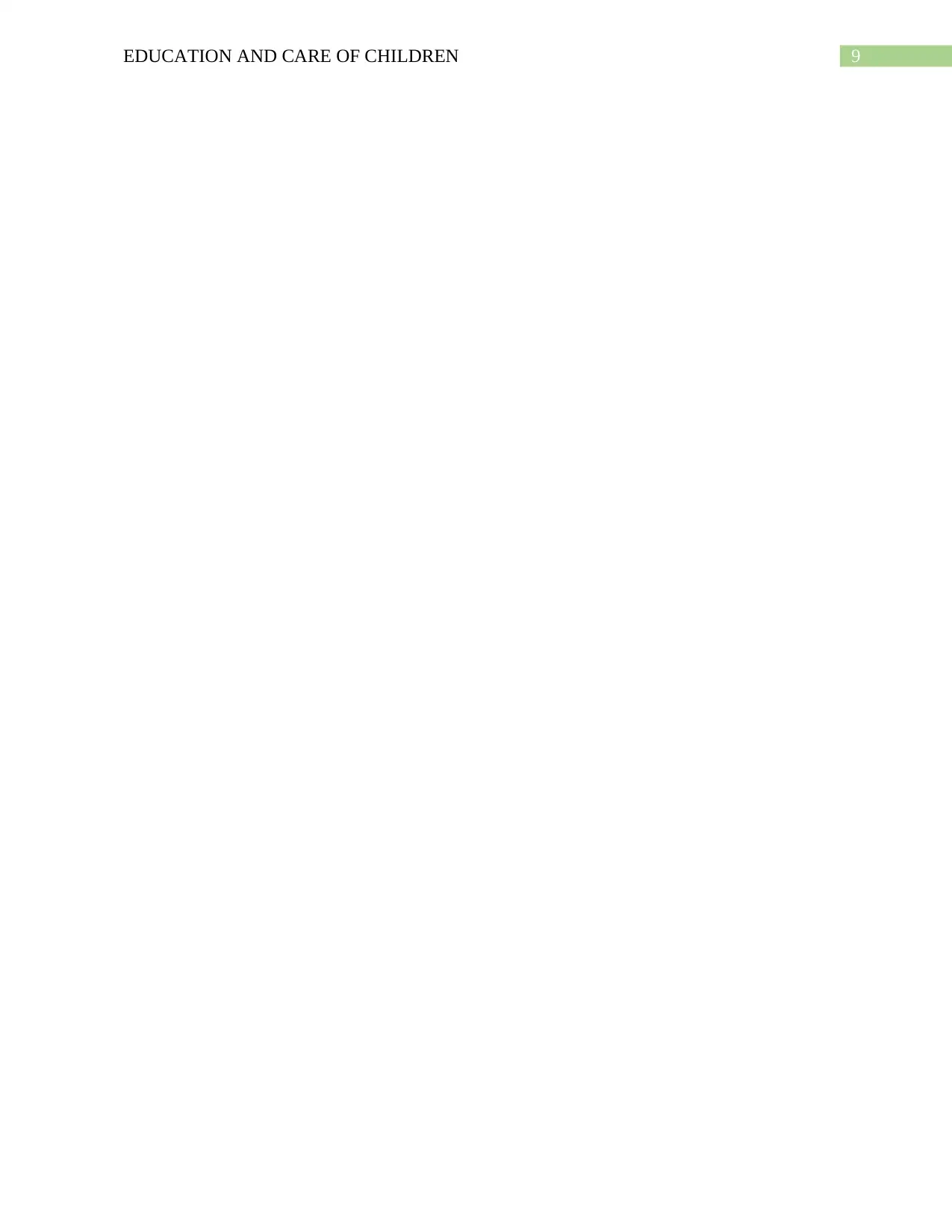
9EDUCATION AND CARE OF CHILDREN
1 out of 10
Related Documents
Your All-in-One AI-Powered Toolkit for Academic Success.
+13062052269
info@desklib.com
Available 24*7 on WhatsApp / Email
![[object Object]](/_next/static/media/star-bottom.7253800d.svg)
Unlock your academic potential
Copyright © 2020–2026 A2Z Services. All Rights Reserved. Developed and managed by ZUCOL.


